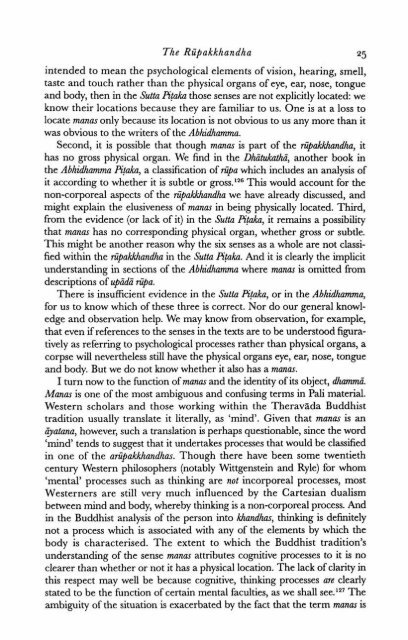Identity and Experience_Hamilton_1996
Identity and Experience_Hamilton_1996
Identity and Experience_Hamilton_1996
You also want an ePaper? Increase the reach of your titles
YUMPU automatically turns print PDFs into web optimized ePapers that Google loves.
The Riipakkh<strong>and</strong>ha 25<br />
intended to mean the psychological elements of vision, hearing, smell,<br />
taste <strong>and</strong> touch rather than the physical organs of eye, ear, nose, tongue<br />
<strong>and</strong> body, then in the Sutta Pith those senses are not explicitly located: we<br />
know their locations because they are familiar to us. One is at a loss to<br />
locate manas only because its location is not obvious to us any more than it<br />
was obvious to the writers of the Abhidhamma.<br />
Second, it is possible that though manas is part of the riipakkh<strong>and</strong>ha, it<br />
has no gross physical organ. We find in the DhZtukathii, another book in<br />
the Abhidhamma fi.h, a classification of 6pa which includes an analysis of<br />
it according to whether it is subtle or gross.126 This would account for the<br />
non-corporeal aspects of the nipakkh<strong>and</strong>ha we have already discussed, <strong>and</strong><br />
might explain the elusiveness of manas in being physically located. Third,<br />
from the evidence (or lack of it) in the Sutta Pitaka, it remains a possibility<br />
that manm has no corresponding physical organ, whether gross or subtle.<br />
This might be another reason why the six senses as a whole are not classified<br />
within the nipakkh<strong>and</strong>ha in the Sutta &ah. And it is clearly the implicit<br />
underst<strong>and</strong>ing in sections of the Abhidhamma where manas is omitted from<br />
descriptions of upzdii nipa.<br />
There is insufficient evidence in the Sutta &aka, or in the Abhidhamma,<br />
for us to know which of these three is correct. Nor do our general knowledge<br />
<strong>and</strong> observation help. We may know from observation, for example,<br />
that even if references to the senses in the texts are to be understood figuratively<br />
as referring to psychological processes rather than physical organs, a<br />
corpse will nevertheless still have the physical organs eye, ear, nose, tongue<br />
<strong>and</strong> body. But we do not know whether it also has a mannr.<br />
I turn now to the function of manas <strong>and</strong> the identity of its object, dhammtf.<br />
Manas is one of the most ambiguous <strong>and</strong> confusing terms in Pali material.<br />
Western scholars <strong>and</strong> those working within the Theravada Buddhist<br />
tradition usually translate it literally, as 'mind'. Given that manas is an<br />
gatana, however, such a translation is perhaps questionable, since the word<br />
'mind' tends to suggest that it undertakes processes that would be classified<br />
in one of the ariipakkh<strong>and</strong>has. Though there have been some twentieth<br />
century Western philosophers (notably Wittgenstein <strong>and</strong> Ryle) for whom<br />
'mental' processes such as thinking are not incorporeal processes, most<br />
Westerners are still very much influenced by the Cartesian dualism<br />
between mind <strong>and</strong> body, whereby thinking is a non-corporeal process. And<br />
in the Buddhist analysis of the person into Ah<strong>and</strong>has, thinking is definitely<br />
not a process which is associated with any of the elements by which the<br />
body is characterised. The extent to which the Buddhist tradition's<br />
underst<strong>and</strong>ing of the sense manas attributes cognitive processes to it is no<br />
clearer than whether or not it has a physical location. The lack of clarity in<br />
this respect may well be because cognitive, thinking processes are clearly<br />
stated to be the function of certain mental faculties, as we shall see.12' The<br />
ambiguity of the situation is exacerbated by the fact that the term manus is


